Related Research Articles

Ilya Yefimovich Repin was a Russian painter, born in what is now Ukraine. He became one of the most renowned artists in Russia during the 19th century. His major works include Barge Haulers on the Volga (1873), Religious Procession in Kursk Province (1880–1883), Ivan the Terrible and His Son Ivan (1885); and Reply of the Zaporozhian Cossacks (1880–1891). He is also known for the revealing portraits he made of the leading literary and artistic figures of his time, including Mikhail Glinka, Modest Mussorgsky, Pavel Tretyakov and especially Leo Tolstoy, with whom he had a long friendship.
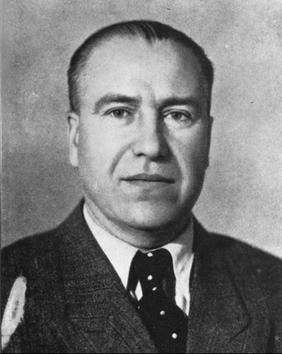
Aleksandr Aleksandrovich Deyneka was a Soviet and Russian painter, graphic artist and sculptor, regarded as one of the most important Russian modernist figurative painters of the first half of the 20th century. His Collective Farmer on a Bicycle (1935) has been described as exemplifying the socialist realist style.
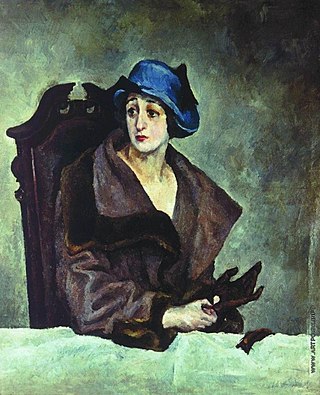
Alexander Alexandrovich Osmerkin was a Russian painter, graphic artist, stage designer, and art teacher. He was a member of the Knave of Diamonds avant-garde group, AKhRR, and Society of Moscow Artists (OMKh) groups. Since 1932 he was a member of the Leningrad Union of Artists.
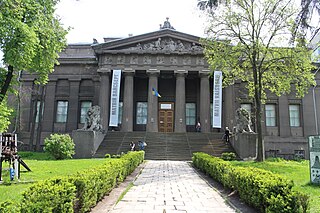
The National Art Museum of Ukraine is a museum dedicated to Ukrainian art in Kyiv, Ukraine.
Illya Chichkan is a representative of the art movement "Ukrainian New Wave", which developed in the 1990s. He is a third generation artist. He lives and works in Berlin, Germany, and Kyiv, Ukraine, as a painter, author of installations, photo and video-projects.
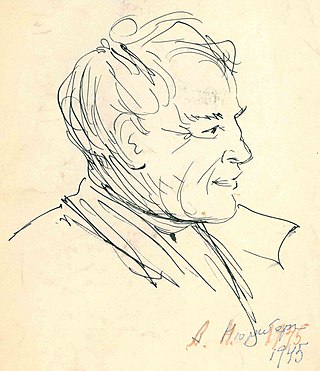
Amshey Markovich Nurenberg was a Ukrainian, Russian and Soviet painter, adherent of the School of Paris, graphic artist, art critic, and memoirist.
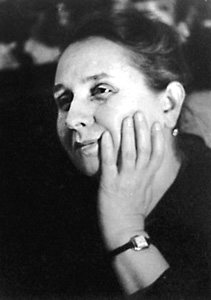
Taisia Kirillovna Afonina was a Ukrainian and Russian painter and watercolorist. She lived and worked in Leningrad, was a member of the Saint Petersburg Union of Artists, and is regarded as one of the representatives of the Leningrad school of painting.

Ivan Grigorievich Savenko was a Soviet painter, Honored Artist of the RSFSR, lived and worked in Leningrad, regarded as one of representatives of the Leningrad school of painting, most famous for his landscape paintings.
Boris Mikhailovich Lavrenko was a Russian Soviet realist painter, People's Artist of the Russian Federation, professor of the Leningrad Institute of Painting, Sculpture and Architecture named after Ilya Repin, who lived and worked in Saint Petersburg, regarded as one of the major representatives of the Leningrad school of painting.

Piotr Petrovich Belousov was a Ukrainian and Russian graphic artist, painter, art teacher, professor of the Ilya Repin Leningrad Institute of Painting, Sculpture and Architecture, People's Artist of the USSR, corresponding member of the Academy of Arts of the USSR, who lived and worked in Leningrad. He was regarded as one of the brightest representatives of the Leningrad school of painting, being most famous for his portraits and historical paintings.

Alexei Grigorievich Eriomin was a Russian Soviet realist painter, People's Artist of the Russian Federation, who lived and worked in Saint Petersburg. He was a member of the Saint Petersburg Union of Artists, and regarded as one of the representatives of the Leningrad school of painting, most famous for his paintings devoted to peoples and nature of Northern Karelia.
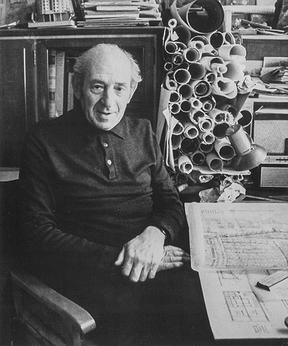
Joseph Karakis was a Ukrainian Soviet architect, urban planner, painter and teacher, and one of the most prolific Kyiv architects, designing many buildings that are now considered architectural landmarks. More than two-thousand schools were built in the Soviet Union from designs created by Karakis, and overall there were more than four thousand buildings built from his designs.

Zinaida Yevgenyevna Serebriakova was a Russian and later French painter.
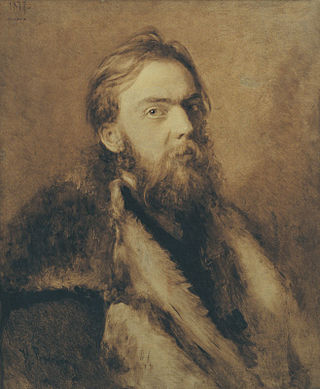
Mykola Ivanovych Murashko was a Ukrainian painter, art teacher, art critic and art historian, who belonged to promoters of the Russian movement of Peredvizhniki; he was a student and successor of painter Adrian Prakhov at the St. Petersburg Academy of Arts, the founder and the first director of his own private drawing school in Kyiv and memoirist.
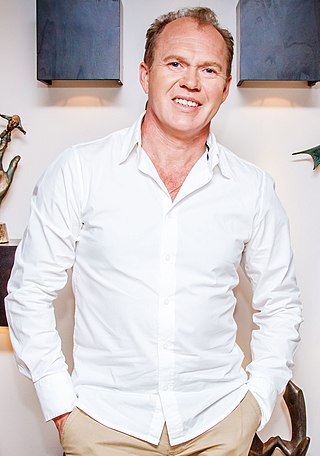
Yuri Komelkov is a Ukrainian publisher, gallerist, art collector, and art patron. He is the founder of the full-service advertising agency Atlant UMC (1997), Re!Zoni magazine (2001), the founder of the company Art-Blues (2002) and the Art-Blues gallery (2004), the owner of the Triptych gallery (2003), the founder and the editor-in-chief of Aura magazine (2007), the founder of Cultprostir Internet platform (2014). He also established and ran the artist Ivan Marchuk's charity foundation (2005) and CultAura foundation (2013).
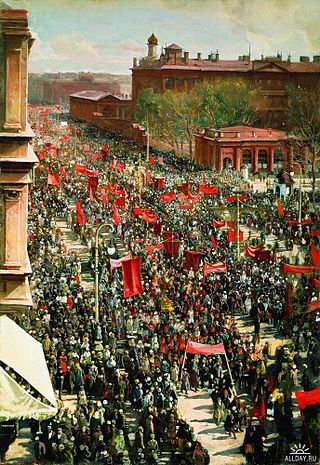
The fine art of Leningrad is an important component of Russian Soviet art—in the opinion of the art historians Vladimir Gusev and Vladimir Leniashin, "one of its most powerful currents". This widely used term embraces the creative lives and the achievements of several generations of Leningrad painters, sculptors, graphic artists and creators of decorative and applied art from 1917 to the early 1990s.
Alexei Afanasyevich Kokel was a Chuvash painter who rose to prominence in Russia and Ukraine during the pre-Soviet and Soviet eras.

The Pozhalostin Ryazan Regional and State Art Museum is one of the oldest art museums in Russia. It houses about 12,000 items of Russian and Western Art, mainly paintings, graphics, sculptures, traditional arts and crafts, dating from the late 15th to the late 20th centuries. Its Western collection includes some works of the painters of the Flemish, French, and Italian schools, as well as porcelain items from English, German, and French manufacturers. A number of paintings, drawings, and sculptures, including several ancient icons, represent the museum's Russian Art collection. The works of Ryazan artists occupy an important part of the exposition.

Olga is a two-act ballet by Ukrainian composer Yevhen Stankovych and librettist Yuriy Ilyenko based on the life of Olga of Kiev, which was written in 1981 to commemorate the 1500th anniversary of the city of Kyiv.
The Easter truce was a proposed ceasefire between Russian and Ukrainian forces during 2022 Russian invasion of Ukraine. It was to take place during Christian Easter – from 21 to 25 April 2022, however, this plan was never materialized as Russia refused it, despite the fact that Ukraine agreed to it. The proposal was also supported by the European Union.